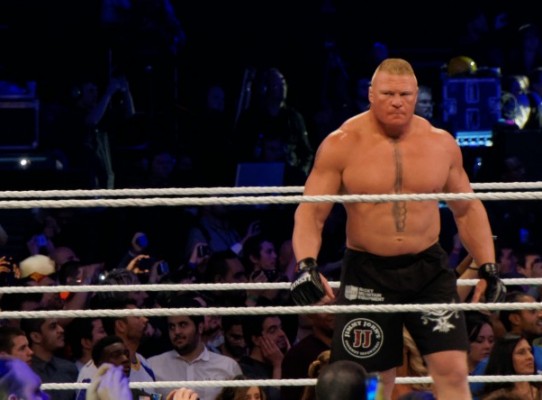The Rise of UFC into Mainstream Culture
Brock Lesnar’s MMA career has ended, but his impact on UFC has not. (PHOTO COURTESY OF MIGUEL DISCART VIA FLICKR)
April 15, 2015
There is no doubt that mixed martial arts and the preeminent league for MMA competition, the Ultimate Fighting Championship (UFC), have soared in popularity over the last decade, but how has it supplanted boxing as America’s favorite combat sport?
A few weeks ago, I was watching SportsCenter when a breaking news update logo flashed on the screen. Normally, this is used on the program for important events like a possible no hitter in baseball or a star player declaring for the NBA draft. However, this time, the announcement was that Brock Lesnar would not return to the UFC and would instead continue to professionally wrestle in the WWE. This seemed strange to me because although I know that Lesnar is a popular celebrity, his decision to not leave wrestling seemed strange to showcase as a gigantic, breaking news story. However, upon further contemplation, it soon became apparent that this was such an important story not only because of Lesnar’s popularity, but also because of the popularity and mainstream appeal of the UFC.
Since its inception in 1993, UFC has catered to a market and fanbase that has grown from niche to exponentially popular. At UFC 184, according to venuestoday.com, the company nearly sold out the Staples Center in Los Angeles, with an estimated 16,577 in attendance and a gross sales of $2,675,560. The show also sold somewhere between 650,000-700,000 in Pay-Per-Views. With the event costing $60 dollars in high definition, UFC has clearly made a huge amount of profit for their organization. However, what has catapulted the league into mainstream acceptance, ESPN coverage and a popularity possibly rivaling boxing can be most accredited to one thing: the production of superstars within the organization, specifically Ronda Rousey and the aforementioned Lesnar.
Lesnar joining the UFC in 2008 and his winning of the organizations Heavyweight Championship gave the company a legitimacy and mainstream interest it never had before, despite the presence of in-house stars such as Randy Couture, Quinton “Rampage” Jackson and Georges St-Pierre. Lesnar only won five matches in the UFC and lost three before diverticulitis ended his mixed martial arts career. However, his presence put UFC on the radar of many who wouldn’t have otherwise watched.However, it has been Rousey who has truly given UFC prominence over similar events such as boxing.
Ronda Rousey is simply the biggest star that UFC has right now and her appeal is clear. Not only is she the most dominant athlete in her sport (she is currently undefeated), but she is also arguably the most popular female athlete on the planet, with only Venus and Serena Williams in tennis really standing in opposition. She is a star in her sport and also a mainstream celebrity with appearances not only on the Tonight Show and Jimmy Kimmel Live, but in film roles such as “The Expendables 3” and the latest “Fast and Furious” movie. Rousey’s rise has not only helped the UFC sell Pay-Per-Views and merchandise, but has paved the way for it to house the most famous fighter in the world besides Floyd Mayweather.
A few days after Lesnar’s announcement, I saw on ESPN.com that Ronda Rousey appeared at Wrestlemania with Dwayne “The Rock” Johnson. Now, even with Johnson’s superstar status, it was a bit surprising for a sports website to cover professional wrestling because while its performers are athletic, it is not necessarily competitive or a sport. However, when one looks at the rise of UFC and of Rousey’s superstardom, the reason for ESPN covering her appearance at the event becomes clear. Rousey, like Lesnar before her, is legitimizing UFC, one fight or television appearance at a time.










